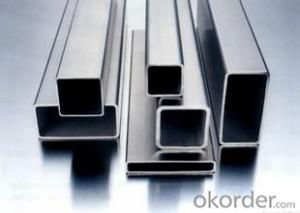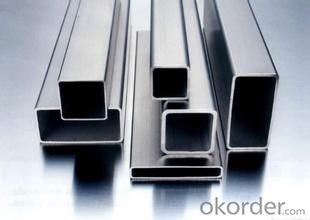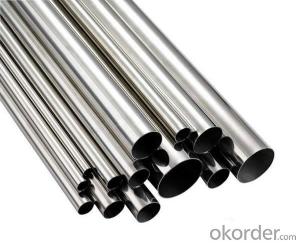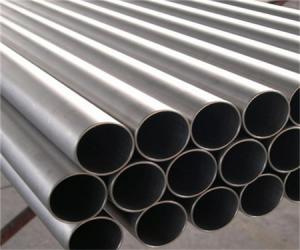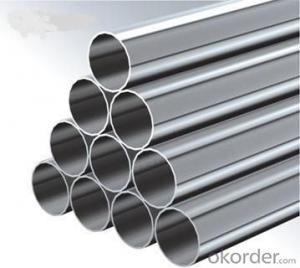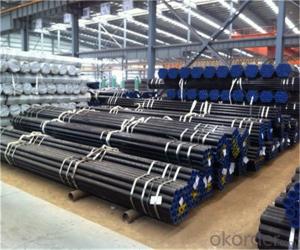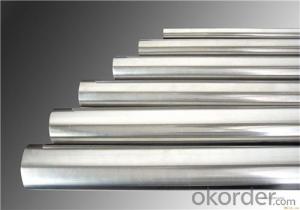Corrosion resistant 304 stainless steel tube
- Loading Port:
- Tianjin
- Payment Terms:
- TT OR LC
- Min Order Qty:
- 10 m.t.
- Supply Capability:
- 3000 m.t./month
OKorder Service Pledge
OKorder Financial Service
You Might Also Like
seamless steel pipe 304
1.Type:seamless
2.Standard:ASTM
3.Material Grand:304 stainless steel
4.Size:OD8-1000MM*WT0.5-80MM
seamless steel pipe 304
Standard: | JIS, AISI, ASTM, GB, DIN, EN | Place of Origin: | Zhejiang China (Mainland) | Brand Name: | SR |
Type: | Seamless | Steel Grade: | 300 Series | Certification: | ISO |
Thickness: | 0.8mm--22mm | Outer Diameter: | 20mm--800mm | process: | Cold drawn,cold roll |
product: | seamless pipe/tube,elbow,tee,reducer | MOQ: | 1000kg | standard: | A312/A213/A269/A249/A358/A268/A789/ |
Packaging & Delivery
Packaging Detail: | Standard seaworthy package(wooden boxes package,pvc package, and other package) |
Delivery Detail: | 5-30 days after confirmation of prepayment depending on quantity |
Tolerance | a) Outer Diameter: +/- 0.2mm b) Thickness: +/- 0.02mm c) Length: +/- 5mm |
Surface | 180G, 320G, 400G Satin / Hairline 400G, 500G, 600G or 800G Mirror finish and so on. |
Specification | ASTM A213,ASTM A312,ASTM A269,ASTM A778,ASTM A790,DIN 17456,DIN 17458,JIS G3459,JIS G3463 etc |
Material | TP304,TP304L,TP304H,TP304/304L,TP316,TP316L,TP316/316L,TP310,TP317, TP317L,TP321,TP321H,TP347,TP347H,S31803,S32205(Duplex),904L etc |
Application range | Stainless steel pipe applies to construction field, ships building industry, petroleum & chemicalindustries, war and electricity industries,food processing and medical industry, boiler heat exchanger,machinery andhardware fields. Stainless steel pipe can be made accordingto the customers requirements. |
Delivery conditions | Annealed, pickled & polished. |
Note | We can produce other standard as the customers’ requirement. |
- Q: Can steel pipes be used for stadium construction?
- Yes, steel pipes can be used for stadium construction. Steel pipes offer several advantages that make them suitable for this purpose. Firstly, steel pipes are strong and durable, making them capable of withstanding heavy loads and providing structural stability to large structures like stadiums. They have high tensile strength, which means they can resist bending or breaking under pressure. Additionally, steel pipes are resistant to corrosion, which is crucial for outdoor structures like stadiums that are exposed to various weather conditions. Their resistance to rust and other forms of degradation ensures the longevity of the stadium. Furthermore, steel pipes are versatile and can be easily fabricated into different shapes and sizes, allowing for customized designs and efficient installation. Moreover, steel pipes offer cost-effectiveness in stadium construction. They can be easily produced in large quantities, making them readily available and affordable. The ease of transportation and installation of steel pipes also contributes to their cost-effectiveness. Another advantage of using steel pipes for stadium construction is their sustainability. Steel is a recyclable material, and using steel pipes promotes environmental responsibility. The recyclability of steel reduces the demand for new materials and minimizes waste. In summary, steel pipes can indeed be used for stadium construction due to their strength, durability, resistance to corrosion, versatility, cost-effectiveness, and sustainability.
- Q: Material of welded steel pipe
- GB/T14980-1994 (large diameter welded pipe for low pressure fluid delivery). Mainly used to transport water, sewage, gas, air, heating, steam and other low-pressure fluid and other uses. Its representative material is Q235 grade a steel.GB/T12770-1991 (stainless steel welded pipe for mechanical structure). Mainly used in machinery, automobiles, bicycles, furniture, hotels and restaurants, decorations and other mechanical parts and structures. Its representative material 0Cr13, 1Cr17, 00Cr19Ni11, 1Cr18Ni9, 0Cr18Ni11Nb and so on.
- Q: How are steel pipes used in hydroelectric power plants?
- Steel pipes are used in hydroelectric power plants to transport water from the reservoir to the turbines. These pipes are designed to withstand high pressure and are often used for penstocks, which are large vertical pipes that deliver water to the turbines at a controlled rate. The durability and strength of steel pipes make them ideal for withstanding the force of the flowing water and ensuring a reliable water supply for power generation.
- Q: Are steel pipes suitable for semiconductor manufacturing plants?
- Yes, steel pipes are suitable for semiconductor manufacturing plants. Steel pipes offer several advantages such as high strength, durability, and resistance to corrosion, making them ideal for transporting various fluids and gases used in semiconductor manufacturing processes. Additionally, steel pipes can withstand high pressure and extreme temperatures, ensuring the safe and efficient operation of semiconductor manufacturing plants.
- Q: What are the environmental impacts of steel pipe production?
- The environmental impacts of steel pipe production include the extraction of raw materials (iron ore, coal, and limestone) which leads to habitat destruction and soil erosion. The manufacturing process requires significant energy, contributing to greenhouse gas emissions and air pollution. Additionally, the production generates waste materials, such as slag and by-products, that can contaminate water sources if not properly managed. Finally, the transportation of steel pipes adds to carbon emissions and can disrupt ecosystems if not done sustainably.
- Q: Can steel pipes be used for underground cable ducting?
- Underground cable ducting can utilize steel pipes, as they possess durability and strength. Due to their robustness, steel pipes commonly serve as a protective casing for cables, warding off potential harm from external factors like moisture, pressure, and environmental elements. Moreover, steel pipes exhibit resistance to corrosion, rendering them suitable for extended underground use. In addition, their ability to withstand heavy loads deems them ideal for areas where cables may face high pressure or weight. Nevertheless, before selecting steel pipes for underground cable ducting, it is vital to take into account soil conditions, installation requirements, and the specific needs of the cable system.
- Q: How do steel pipes handle pressure surges?
- Steel pipes possess exceptional strength and durability, enabling them to effectively manage pressure surges. When pressure surges arise within a pipeline system, steel pipes exhibit the capability to withstand and absorb heightened forces without experiencing breakage or rupture. The commendable tensile strength of steel grants resistance against the pressure imposed upon the pipes, preventing deformation or collapse during sudden surges. Furthermore, steel pipes possess a commendable burst pressure rating, signifying their capacity to endure substantial pressure increases without succumbing to failure. Additionally, steel pipes are frequently engineered with thicker walls, bolstering their capacity to handle pressure surges. The increased wall thickness assists in distributing the augmented force evenly, thereby minimizing the possibility of localized stress and potential points of failure. Moreover, steel pipes are frequently employed in conjunction with fittings and valves specially designed to tackle pressure surges. These fittings and valves are composed of similar materials, ensuring compatibility and preserving the integrity of the pipeline system. All in all, steel pipes are excellently suited to manage pressure surges due to their strength, durability, and ability to endure high pressures. Their resistance to deformation, notable burst pressure rating, and compatibility with specialized fittings and valves render them a dependable choice for applications where pressure surges may arise.
- Q: Can steel pipes be used for conveying natural gas?
- Yes, steel pipes can be used for conveying natural gas. Steel pipes have been widely used in the natural gas industry due to their strength, durability, and ability to withstand high pressure. Additionally, steel pipes are resistant to corrosion and provide a secure and reliable method for transporting natural gas over long distances.
- Q: Can steel pipes be used for oil transportation?
- Yes, steel pipes can be used for oil transportation. Steel pipes are commonly used in the oil and gas industry for the transportation of crude oil, petroleum products, and natural gas. They are preferred due to their strength, durability, and resistance to corrosion. Steel pipes are capable of withstanding high-pressure environments and can be used for both onshore and offshore oil transportation. Additionally, steel pipes can be welded together to form long pipelines, making them a cost-effective solution for transporting oil over long distances. Overall, steel pipes are a reliable and efficient choice for oil transportation.
- Q: How are steel pipes used in the shipbuilding industry?
- Steel pipes are extensively used in the shipbuilding industry for various purposes such as carrying fluids, gases, and other materials throughout the ship. They are used for the ship's plumbing systems, including water supply, drainage, and firefighting systems. Steel pipes are also used for the ship's ventilation and air conditioning systems, as well as for fuel and oil transfer. In addition, they play a crucial role in the construction of the ship's structural framework, providing strength and durability.
Send your message to us
Corrosion resistant 304 stainless steel tube
- Loading Port:
- Tianjin
- Payment Terms:
- TT OR LC
- Min Order Qty:
- 10 m.t.
- Supply Capability:
- 3000 m.t./month
OKorder Service Pledge
OKorder Financial Service
Similar products
Hot products
Hot Searches
Related keywords
